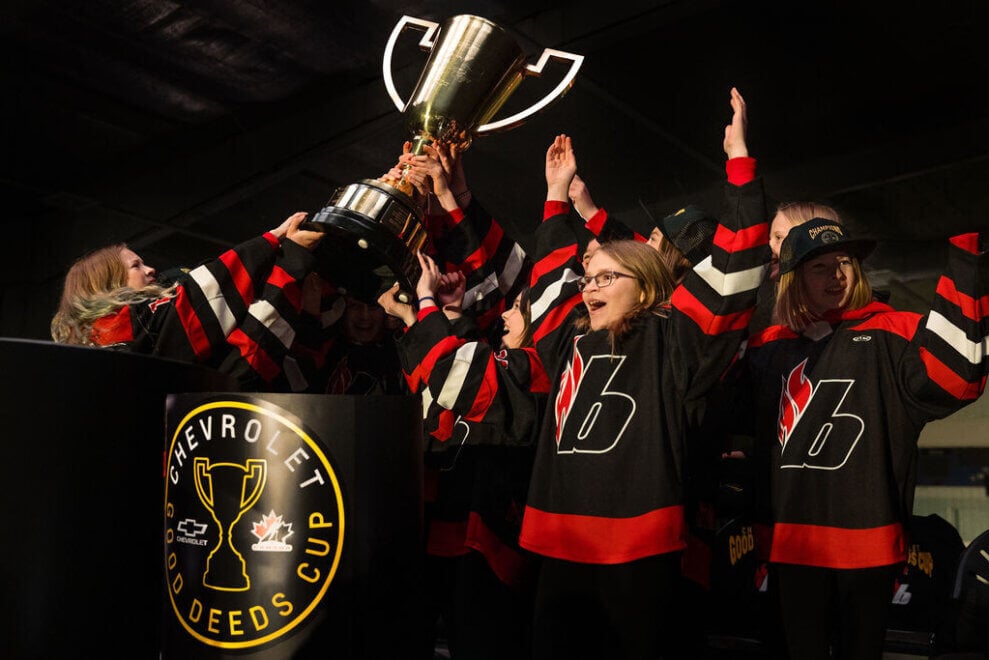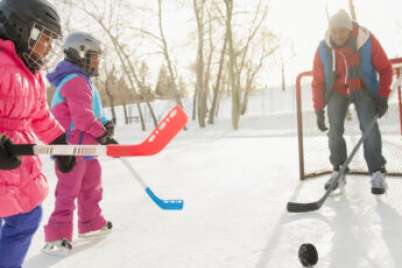
Bigger than the game: Hockey players give back
In small towns and large cities across the country, new generations of hockey players, long-time volunteers, and organizations are giving back to their communities through innovative and generous initiatives.
Teams are trading sticks for rakes, packing boxes with non-perishable food, fundraising so that more kids can access the sport, and showing that a commitment to serving the community is just as important as their achievements on the ice.
Here are some teams and organizations that have gone above and beyond—demonstrating unity, selflessness, dignity, and respect.
Filling the donation boxes
The Sudbury Playground Hockey League (SPHL) has a long history of giving back to the community in meaningful ways—70 years’ worth. Since its inception, volunteers and parents have introduced their young players to the sport, while stressing enjoyment of the game, sportsmanship, being a team player, and understanding the importance of giving back.
Twelve years ago, the Greater Sudbury Police Service joined with the SPHL to launch an in-house hockey tournament. Through the years, the Police Cup Tournament held at the Gerry McCrory Countryside Sports Complex, and the Cambrian and Carmichael arenas, has sponsored underprivileged children with the purchase of hockey equipment, and encouraged players and their families to donate food or money in support of the Sudbury Food Bank. Teams from each division compete to see who can donate the most and in the past 12 years, the Police Cup has collected over 5,000 pounds of food per tournament and over $5,000 in total donations.
SPHL president Ernest Boeswald notes that another objective of the Police Cup Tournament is to humanize the city’s peace officers. “So often, adolescents fear or are intimidated by police officers, especially adolescents who may have had direct or indirect interactions with the police. At the Police Cup Tournament, there are a number of uniformed police officers walking around and interacting with the players and their families. The atmosphere around the arena is that of excitement for everyone in attendance.”
In addition to the annual tournament, the grassroots organization has paid the registration fees for families who cannot afford to play, helped players and family members undergoing medical treatment, and offers a $500 bursary program to a bantam player in their last year with the organization—money that can be used for college or university expenses.
“The culture of the SPHL has always been community and family driven. An organization inclusive to all—allowing players to have that need and sense of belonging,” says Boeswald.
Life-changing friendships
In Attawapiskat, Ont., teenage hockey players visiting from over 1,000 kilometres away participate in a trip to a traditional hunting camp, a pow wow, ceremonies in a teepee and, of course, hockey. They’re part of Hockey Cares, a powerful cultural exchange of young male and female players from the small community of Attawapiskat near the shores of James Bay, and players from Oakville, Ont. The program is part of the national charity True North Aid and offers participating youth a life-changing experience where they learn about each other’s cultures, make lasting friendships, and promote reconciliation between Indigenous and non-Indigenous people in Canada.

Hockey Cares was started in 2017 by Oakville resident Sue Heddle to highlight the hardships experienced by some Canadians, including inadequate housing and access to clean drinking water. “It’s an eye-opener for Oakville kids to go up north and to experience the beauty of James Bay and the stars,” says Heddle. “It is also an experience living where you can’t just get the water from the tap and there’s also the crisis of teen suicide.”
During the exchanges, the players share their unique journeys with each other. “Participants in our past exchanges still regularly communicate with each other and say they have made strong bonds in the other community and learned a lot about the challenges facing Indigenous people. Oakville youth participants have gone on to share their experiences with their local school communities, and some have been inspired to organize hockey equipment drives for First Nations communities. Attawapiskat participants have learned about additional education and training opportunities that exist outside their communities,” says Ally Cooper from Hockey Cares.
After pausing during the pandemic, the exchange program returned this year for its fourth edition. Oakville players will travel to Attawapiskat in November, after having hosted their new northern friends in July for five days of hockey, learning, and building lifelong bonds.
Breaking down barriers
In October, Neveah Maddigan’s entire AA season registration cost of $1,660 was covered by the Calgary Flames in partnership with Black Girl Hockey Club (BGHC), a non-profit organization based in the United States. Maddigan is one of 10 recipients of the global scholarship program for Black girls and young women aged 9 to 18 years old, which has given approximately $130,000 to 61 Black girls in Canada, the U.S., the U.K., and Kenya since 2020.
The program aims to enhance the number of Black girls in the sport and increase their playing opportunities by breaking down the financial barriers associated with hockey. BGHC offers scholarships of up to $5,000 (US) three times a year, which can be put towards equipment costs, registration, tournaments, and hockey camps associated with girls’ involvement in hockey.
The mission of Black Girl Hockey Club is to “inspire and sustain passion for the game of hockey within the Black community, specifically with our mothers, sisters, daughters and friends,” says Isabel Graham, an administrator with the club.
Through the scholarship program, the organization aims to eradicate the persistent racial inequalities that plague hockey, a sport where Black women and girls in particular are severely underrepresented. A 2019 survey of sports parents by the Aspen Institute’s Project Play and the Utah State University’s Families in Sports Lab showed the challenges that Black children experience getting into, and staying in, sports. The survey showed that hockey is one of the three most expensive sports to play and that fewer than 2% of Black children participate in the sport.
Further research by the Women’s Sports Foundation showed that fewer Black female athletes receive athletic opportunities and the benefits of sports compared to their white counterparts. Also, their participation was heavily concentrated in a limited number of sports, namely basketball and track and field. The foundation stressed the need to create opportunities for boys and girls of colour at the grassroots levels, and access to youth scholarship programs, grants, and sponsorship opportunities for girls and women of colour. “Such efforts will remove socio-economic class barriers to their sports participation.”
In addition to scholarships, BGHC offers the Leadership & Development Program which connects Black professionals with established leaders and executives within hockey to share advice, resources, and connections to advance their careers in hockey. Since 2018, the organization has also hosted meetups at hockey games and events across the United States and Canada, partnered with organizations such as the Colorado Avalanche and Erie Otters, presented a monthly book club, and a Self-Care Sundays series during Black History Month. Virtual events were also held during the pandemic, mostly around the theme of the Get Uncomfortable Campaign, which aims to disrupt racism on and off the ice and make hockey welcoming for everyone.
“We hope by carving out a safe space for Black women and the people who love them, we can grow the game of hockey in Black communities all across the world,” says Graham.
Anyone interested in donating to BGHC or volunteering with the Leadership & Development Program or the Get Uncomfortable Campaign can visit blackgirlhockeyclub.org
Other commendable and inspiring stories
More stories can be found in British Columbia, where the West Vancouver Minor Hockey Association is supporting a Ukrainian family as they resettle in Canada, and in Alberta, where the Airdrie Techmation Thunder recently spent four hours raking a senior’s 10-acre property. “The boys want to give back to the community—that’s one of our big initiatives this year,” said Shaun Guest, the team’s general manager, to Airdrie Today.

Also in Alberta are the Lloydminster Female U13 Blazers, who in April were named the season six winners of the Chevrolet Good Deeds Cup—the first all-female minor hockey team to become season champions. The challenge seeks to inspire young Canadians to do good by transforming the positive values learned through hockey into good deeds within their communities.
“After witnessing first-hand how an inaccessible arena can affect others, the players and coaching staff researched accessible rinks. They showed true leadership in their advocacy to help ensure that the Lloydminster Minor Hockey Association and our brand new Lloydminster Place includes all people,” said Lloydminster Mayor Gerald Aalbers.
Has your team taken part in a charitable act, or been inspired to help out the community? Let us know in the comments!
Header image: Hockey Cares





